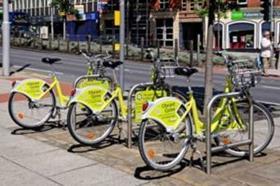The Urban Transport Group (UTG) has urged the government to take a more “ambitious, open and forward-thinking” approach to freight strategy.
Speaking to Freightinthecity.com ahead of next month’s Spring Summit in Birmingham, MD Jonathan Bray said the DfT had left a “big hole” where freight strategy should be, with more work needed to address this issue.
He added. “Historically, it's tended to be about responding to short-term issues and working closely with existing freight lobbies.

“With a lot of the interesting things happening on freight, the DfT is a bit of a bystander really.
"I think the DfT needs to take a more ambitious, open and forward-thinking strategic approach to freight.”
UTG has been working with cities to help address this lack of national focus, so they can see the benefits from working freight into their strategic transport plans.
It has undertaking research into the challenges from increasing levels of urban deliveries, and highlighted actions they could take to mitigate the impact in its report Delivering the Future.
“We've tried to make the freight debate more accessible to decision-makers in cities. I think the freight debate has a tendency to be locked into a lot of detail and long lists of issues,” said Bray.
“Senior decision-makers only have so much bandwidth. They want the simple way forward, not just a list of 120 problems.”
UTG suggests a formula that can be adopted in any city: transport more long-haul freight into the sub-regions by rail or water – although not ignoring the capacity constraints for modal switch – while ensuring last-mile deliveries have as little impact as possible on the urban environment.
Living cities
Cities are also increasingly setting transport strategies in response to the ‘place-making’ agenda, said Bray: people wanting places for people, with less space for vehicles, no matter what their purpose.
Far more emphasis is being placed on the urban realm and more value is being placed on city centres, all of which is exacerbated by a need to address air quality issues.
“I think the air quality imperative will get more acute with the third version of the government's air quality strategy. I suspect it may be a more serious piece of work than the previous two,” added Bray.

“What's happening as well is that the rest of the available road space is being squeezed and all the lobbies want their space: the active travel lobby - cycling isn't going away and nor should it; the bus lobby is very vigorous in wanting their bus lanes; and freight and logistics need space to deliver.”
“The squeeze is on roads capacity,” warned Bray and a wider debate needed about future streets, which bring together both place-making and urban transport planners.
Embracing change
He wants to encourage the freight and logistics sector to become more engaged in the vision for future cities and the wider service agenda, as there could be plenty of opportunities for operators.
“The freight and logistics sector is very quick to take on new tech and innovation, but when people are talking about smart cities, they are thinking about apps and Uber and start-ups," said Bray.
“The freight sector is naturally very preoccupied with logistical operations, but I think it could also present itself as a partner in the move towards smarter cities in some of these initiatives.”
A little history UTG brings together Britain’s largest metropolitan transport authorities under one organisation to address both passenger and freight movements. Members include the likes of Transport for West Midlands, Transport for Greater Manchester and Transport for London (TfL). Historically, the work undertaken by UTG - formerly known as the Passenger Transport Executive Group until January 2016 - had predominantly focused on passenger travel. However, as more and more cities began to move towards combined authorities, UTG realised a more holistic approach to all modes of travel, including freight, was needed and a name change.
At the same time that UTG shifted its focus, TfL came on board as a full member and brought with it “a huge amount of expertise”. “They are one of the most admired transport authorities in the world right now. Certainly when I speak to people in other parts of the world they always speak very highly of London. UTG takes a specific approach to its coverage of freight, looking to ensure it is included in the wider debate about what is happening to transport in cities. Bray says that for too long freight has remained at the edges of transport planning debate, and its inclusion in city-wide strategies is long overdue. “And I think that we've come a long way in a short space of time to mainstreaming freight within cities' transport debates. It's no longer kept at the margins as a fringe topic,” he adds. UTG enables cities to share best practice and learn from other regions about the best ways to address urban freight deliveries. “We offer cities the opportunity to work together and piggyback off existing research rather than have to do it all again themselves,” says Bray. |














